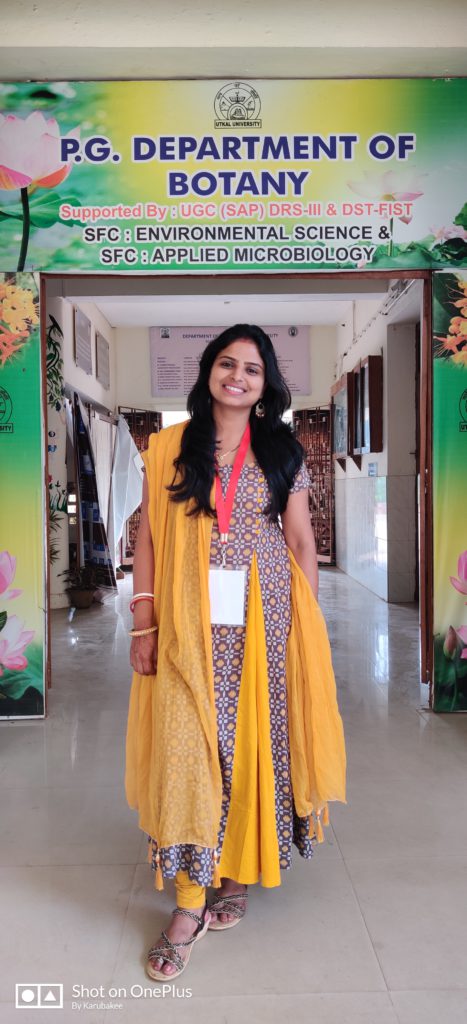Plant breeding and Genetics
Course Attendees
Still no participant
Course Reviews
Still no reviews
Course Name :
Code(Credit) : CUTM1440(3-1-0)
Course Objectives
• This course examines the application of genetic principles to plant improvement.
• Topics include breeding objectives, mating systems, selection, testing and germplasm maintenance of horticultural and crop plants.
Learning Outcomes
The anticipated knowledge, skills and/or attitude to be developed by the student are:
1. Describe sources and types of genetic variation and explain their importance for plant improvement.
2. Locate, analyse, evaluate and synthesise information relevant to plant breeding.
3. Carry out specific plant breeding activities, such as selection of parental germplasm, servation and recording of phenotypic variation and selection among progeny.
Course Syllabus
Genetics and Plant Breeding
Module-I Genetics:
Gene concept, allelism and fine structure of gene. Mendelism and deviation of mendelian ratios, epistasis, linkage and crossing over. Incomplete and complete linkage.
Practice: Demonstration of genetic principles using laboratory organisms.
Module-II Genome mapping:
Sex-linked inheritance, Nuclear and cytoplasmic genome organization, Maternal effect, genome imprinting, two point cross, three point test cross and chromosome mapping, tetrad analysis, extra chromosomal inheritance.Cytoplasmic male sterility.
Module-III
Chromosomal aberrations
Structural aberration: duplication, deficiency, inversion and translocations heterozygotes; numerical chromosome aberrations: aneuploids: trisomics and monosomics; euploids: autopolyploids, allopolyploids, role polyploidy in speciation with reference to triticum and brassica. Polyploids, haploids, aneuploids and their utility. Chromosome variation and evolution.
Practice: Induction of Polyploidy by Colchine.
Module-IV Mutagenesis:
DNA damage and repair mechanisms, Spontaneous and induced mutations and their molecular mechanisms, physical and chemical mutagens, transposable elements and mechanism of transposition.
Module V: Protein engineering
Protein engineering and site directed mutagenesis. In vitro mutagenesis and deletion techniques, gene knock out in bacterial and eukaryotic organisms.
Module VI: Introduction to breeding techniques:
Breeding methods for self & Cross pollinated crops. Self-incompatibility and male sterility in crop plants. Selection; Pureline & mass selection. Line, pedigree, bulk method. Single seed descent & multiline method.
Practice: 1. Demonstration of Pedigree analysis.
2. Learning technique in hybrid seed production using male sterility in field crop.
3. Studying the pollen grain size and germination in various crops - preparation of temporary and permanent slides.
Module VII: Special breeding techniques:
Hybrid breeding and genetic basis of heterosis. Ideotype breeding. Mutation breeding. Molecular breeding (Marker assisted selection & Gene Pyramiding). Genomics Assisted breeding. QTL mapping. Genome wide association studies.
Practice: Demonstration of mutation breeding.
Text Books & Reference Book:
1. Lewin, B. (2004). Gene VIII. Person-Prentice Hall, London.
2. Pierce, B. A. (2006). Genetics: A Conceptual Approach. W. H. Freeman, New York.
3. George Acquaah, "Principles of Plant Genetics and Breeding ". Wiley Blackwell.
4. Allard RW. 1981. Principles of Plant Breeding. John Wiley & Sons.
5. Chopra VL. 2004. Plant Breeding. Oxford & IBH.
6. Gupta SK. 2005. Practical Plant Breeding.Agribios.
https://www.sciencedirect.com/science/article/abs/pii/S0033756071902730
https://link.springer.com/article/10.1023/A:1004162323428
Session Plan
Session 1
Gene concept, allelism and fine structure of gene.
https://www.slideshare.net/PromilaSheoran/gene-concept?qid=1b4111b4-b232-4f44-a6b2-249af5fa94cc&v=&b=&from_search=1
https://www.youtube.com/watch?v=Vh-3SpPgS20
Session 2
Session 3 (Practice-1)
Chromosome mapping using point test cross data.
https://edspace.american.edu/ma2581a/wp-content/uploads/sites/801/2016/10/GeneticsLab1Report.pdf
Session 6
Sex-linked inheritance, maternal effect and genome impriting.
https://www.slideshare.net/ChristopherRamhold/gene-imprintingedited
https://www.youtube.com/watch?v=cBjf-ZV1dVA
https://www.youtube.com/watch?v=h2xufrHWG3E
Session 7
Two point cross, three point test cross and chromosome mapping.
https://www.slideshare.net/zeeshanahmed121121/gene-mapping-ppt-81617490
Session 8
Nuclear and cytoplasmic genome organization and extra chromosomal inheritance.
https://www.slideshare.net/hhalhaddad/281-lec7-genomeorganization
Session 9
Session 11
Session 12
Role polyploidy in speciation with reference to triticum and brassica.
https://www.slideshare.net/GigaScience/daniela-puiu-at-icg12-the-first-nearcomplete-assembly-of-the-hexaploid-bread-wheat-genome-triticum-aestivum?qid=88825c74-5c42-4c22-a160-9c0f1484ef81&v=&b=&from_search=1, https://www.slideshare.net/JafarTanin/prospects-and-breeding-quality-improvement-of-brassica?qid=497d1b93-d51d-427c-bb30-6afc501254e9&v=&b=&from_search=4
Session 13 (Practice-2)
Induction of Polyploidy by Colchine
https://www.jstage.jst.go.jp/article/cytologia1929/9/4/9_4_486/_pdf
Session 14
Haploids, aneuploids and their utility.
https://www.slideshare.net/vruddhidesai/production-of-double-haploid-plants
https://www.youtube.com/watch?v=yNNkyyjM2Eg
Session 15
Chromosome variations & evolution
https://www.slideshare.net/beth__/variation-evolution-48716556
https://www.youtube.com/watch?v=IdWqsI0DSzE
Session 16
DNA damage and repair mechanisms.
https://www.slideshare.net/preetysweta22/preety-sem?qid=388361e3-118b-4001-a3b8-8cb530d87ffa&v=&b=&from_search=1
https://www.youtube.com/watch?v=2yI_SoOWFMU
Session 17
Mutation and types(Spontaneous and induced) and theeir molecuar mechanism.
https://www.slideshare.net/sreerajsree/spontaneous-and-induced-mutations
https://www.youtube.com/watch?v=9bWjuwTiYXI
Session 19
Transposable elements and mechanism of ransposition.
https://www.slideshare.net/BowiyaKS/plant-transposable-elements-where-genetics-meets-genomics?qid=4d155e1e-78b0-438e-a4b5-90bc7e11894f&v=&b=&from_search=7
https://www.youtube.com/watch?v=Mr9xln6tHF8
Session 20
Protein engineering and site directed mutagenesis.
https://www.slideshare.net/NawfalAldujaily/protein-engineering-and-site-directed-mutagenesis?qid=11d23e52-dcdb-4ed0-a9e8-b8dada5a6c64&v=&b=&from_search=2
https://www.youtube.com/watch?v=9uGq4NPv5Tg
Session 21
In vitro mutagenesis and deletion techniques.
https://www.slideshare.net/Maniraj53/in-vitro-mutagenesis-in-fower-crops
https://www.youtube.com/watch?v=WLJ7jxUdf4o
Session 22
Gene knock out in bacterial and eukaryotic organisms.
https://www.slideshare.net/RANASAHA18/gene-knockout-147618912?qid=9c641ff6-8975-4d68-9a92-7e3314a05af0&v=&b=&from_search=4
https://www.youtube.com/watch?v=MzMsgmeEOhI
Session 23
Genetic basis of breeding self & Cross pollinated crops.
https://www.slideshare.net/drshkrp/principles-of-plant-breeding
https://www.youtube.com/watch?v=8ATRfaiaOLg
Session 24 (Practice-3)
Studying the pollen grain size and germination in various crops - preparation of temporary and permanent slides.
https://www.youtube.com/watch?v=Su6fxJQ5q3o
Session 25
Self-incompatibility and male sterility in crop plants.
https://www.slideshare.net/IshitaDey2/self-incompatibility-and-male-sterility-83139397
https://www.youtube.com/watch?v=_ANBC1rz7TQ
Session 26 (Practice-4)
Learning technique in hybrid seed production using male sterility in field crop.
<a href="https://onlinelibrary.wiley.com/doi/pdfdirect/10.1111/tpj.14678
">https://onlinelibrary.wiley.com/doi/pdfdirect/10.1111/tpj.14678
Session 27
Pureline & mass selection.
https://www.slideshare.net/OmPrakash484/selectionpureline-mass-method
https://www.youtube.com/watch?v=7p0vNzeUG3s
Session 28
session 29 (Practice-5)
Demonstration of Pedigree analysis.
Session 30
Single seed descent & multiline method.
https://www.slideshare.net/KAUSHIKKUMARPANIGRAH/presentation-on-single-seed-descent-ssd-method
Session 31
Session 32
Session 33 (Practice-6)
Demonstration of mutation breeding.
http://www-naweb.iaea.org/nafa/pbg/pbg-laboratory.html
Session 34
Molecular breeding (Marker assisted selection & Gene Pyramiding)
https://www.slideshare.net/bawonponchonnipat/molecular-breeding-v4-42982600
https://www.youtube.com/watch?v=H3DtOOTkjRc
Session 35
Case Studies
Case Studies
Our Main Teachers

BHAGYESWARI BEHERA
Assistant Professor, Department of Botany, School of Applied Science, Centurion University of Technology and Management
VIEW PROFILEHave specialization in Biochemistry and Molecular biology. Qualified GATE and NET. Research interest in Biochemistry, Microbiology and taxonomy. Teaching expertise in subject Cell biology, molecular biology, Biochemistry, Genetics, Plant physiology and metabolism.


Recent Comments